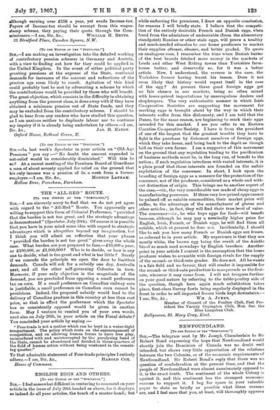THE " ALL-RED " ROUTE.
(To Tea ECrrolt Or rue " SCSCraTos.1
SIR,—I am sincerely sorry to find that we do not yet agree with regard to the " All-Red " Route. You apparently are willing to support this form of Colonial Preference, "provided that the burden is not too great, and the strategic advantage is demonstrated" (Spectator, July 20th). Of course it is possible that you have in your mind some idea with regard to strategic advantages which is altogether beyond my imagination, but I think you will admit on reflection that your phrase provided the burden is not too great" gives away the whole case. What burden are you prepared to face,—£10,000 a year, or £100,000, or 21,000,000? Who is to decide, or how is any one to decide, what is too great and what is too little ? Surely if we concede the principle we open the door to limitless demands. Canada will ask for a subsidy one day, Australia next, ahd all the other self-governing Colonies in turn. Moreover, if your only objection is the magnitude of the demand, you are precluded from opposing a small preference tax on corn. If a small preference on Canadian railway cars is justifiable, a small preference on Canadian corn cannot be pernicious. Indeed, the proposed subsidy would lead to the delivery of Canadian produce in this country at less than cost price, so that in effect the preference which the Spectator has so consistently opposed would be given in another form. May I venture to remind you of your own words, used also on July 20th, in your article on the Fiscal debate ? You concldded your article by eaying "Free-trade is not a matter Which can be kept in a water-tight libinpartment. The policy which rests on the encouragement of competition, and on allowing human forces to have free play, nninterfered with and uninterrupted by the paralysing hand of the tate, cannot be abandoned and derided in three-quarters of the field of liftman action without being weakened in the remain- ing quarter?'
To that admirable statement of Free-trade principles I entirely






































 Previous page
Previous page